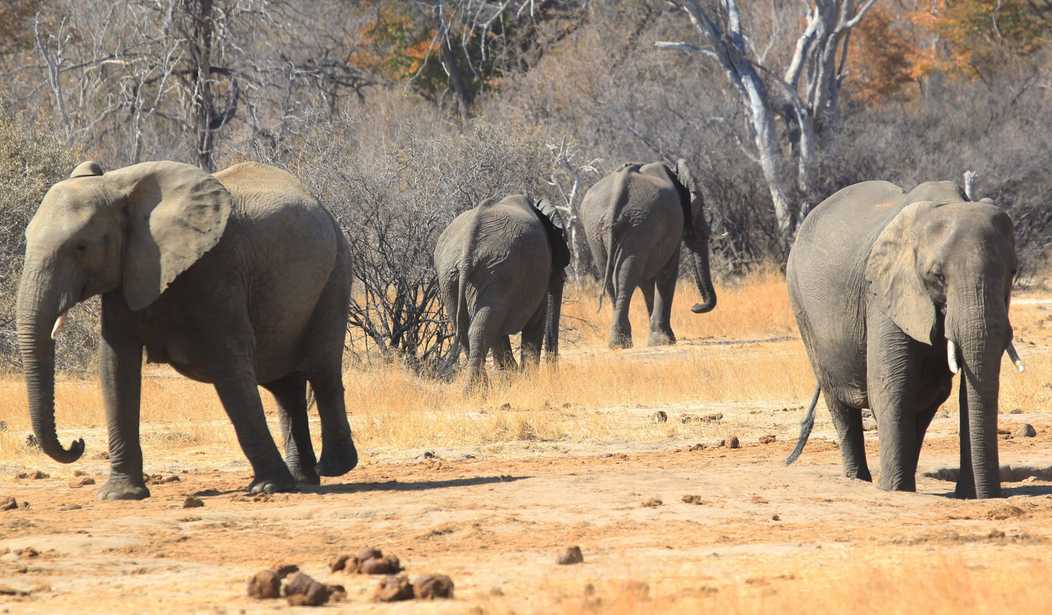WASHINGTON — After the U.S. Fish and Wildlife Service’s plan to reverse an Obama-era ban on importing elephant body parts as “trophies” from big-game hunting sparked outrage, President Trump tweeted tonight that the plan is on hold for now.
The Safari Club International announced FWS would allow imports from Zimbabwe and Zambia. In a statement today, FWS argued that the move was in the name of conservation.
“Like us, Zimbabwe, Zambia and other African countries are passionate about conserving their wildlife for future generations. This commitment is shared by the U.S. hunting community that has done so much for the conservation of wildlife here in America and around the world,” said Service Principal Deputy Director Greg Sheehan. “Funds generated by U.S. hunters are the backbone of conservation efforts in Africa, helping combat the scourge of poaching and wildlife trafficking that is threatening Africa’s wildlife. We will continue work to combat heinous wildlife crimes while empowering and incentivizing local communities to be a part of the solution.”
White House press secretary Sarah Sanders said today that a review beginning in 2014 “established that both Zambia and Zimbabwe had met new standards, strict international conservation standards, that allowed Americans to resume hunting in those countries.”
“A ban on importing elephant ivory from all countries remains in place,” she said. “But again, all of this was based on a study that was conducted that started back to the previous administration, and done by career officials.”
FWS issued the new rule in the Federal Register today: “The U.S. Fish and Wildlife Service (Service) has made a finding that the killing of African elephant trophy animals in Zimbabwe, on or after January 21, 2016, and on or before December 31, 2018, will enhance the survival of the African elephant. Applications to import trophies hunted during this time period will be considered to have met the enhancement requirement, unless we issue a new finding based on available information.”
The Center for Biological Diversity stressed that poaching elephants for ivory is still a big problem in Zimbabwe, with aerial surveys showing a 13 percent decrease in the elephant population from 2007 to 2013.
“This is horrific news for Africa’s rapidly vanishing elephants, and the Trump administration’s timing couldn’t be more bizarre,” senior attorney Tanya Sanerib said in a CBD statement. “Corruption was already a huge concern in Zimbabwe, and it’s shocking that [Interior Secretary Ryan] Zinke is lifting the trophy ban during a military coup. With tanks in the streets, whoever is actually running the Zimbabwe government just can’t be trusted to protect elephants from slaughter by poachers.”
“U.S. trophy hunters shouldn’t be killing elephants when their populations are in decline. There’s no conservation in that,” she added. “The Trump administration’s decision to greenlight the slaughter of this imperiled species is absolutely unacceptable, and we’ll fight it every way we can.”
Trump tweeted tonight, “Put big game trophy decision on hold until such time as I review all conservation facts. Under study for years. Will update soon with Secretary Zinke. Thank you!”
Trump’s sons are big-game hunters who have posed with animals they’ve slaughtered.
Wayne Pacelle, president and CEO of the Humane Society of the United States, noted that it was Zimbabwe where Minnesota dentist Walter Palmer paid $50,000 to kill beloved lion Cecil.
“For decades, Zimbabwe has been run by a dictator who has targeted and killed his political opponents, and operated the country’s wildlife management program as something of a live auction,” Pacelle wrote on the HSUS website. “…Palmer paid a big fee even though it did irreparable damage to the nation’s reputation.”
Pacelle argued that origination of the policy change announcement from the Safari Club, “the largest pro-trophy-hunting lobby group,” suggests “an uncomfortably cozy and even improper relationship between trophy hunting interests and the Department of the Interior.”
“Even more ominous, the FWS has just erected a new website that provides a guide to trophy hunters seeking to import lion trophies. Just last year the FWS listed the lion as threatened with extinction under the Endangered Species Act, set up criteria that must be met before the FWS would allow the import of lion trophies, and prohibited imports of trophies from captive lion populations hunted in fenced enclosures – commonly referred to as canned lion hunting – in South Africa,” he continued.
“Unbelievably the news gets even worse, as the Department of the Interior has also just announced that it is forming a euphemistically named advisory group, the International Wildlife Conservation Council, that would allow trophy hunters an even more prominent seat at the table of government decision-making, ignoring the copious science that trophy hunting undermines the conservation of threatened and endangered species.”
Safari Club president Paul Babaz said his group “will be more proactive and not back down.”
“For me, it’s not as much about winning a debate as it is having our voices heard, being able to deliver some indisputable scientific facts, and lastly, represent all hunters as a proud hunter myself,” he said.









Join the conversation as a VIP Member